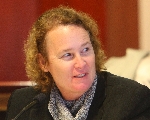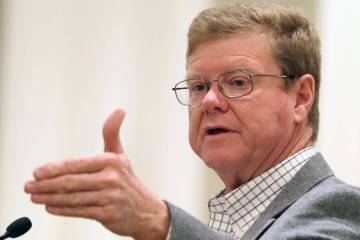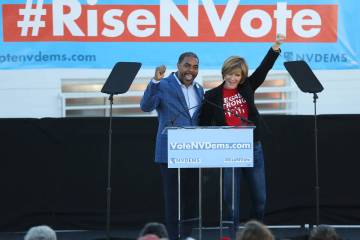Business tax called ‘same old, same old’
CARSON CITY -- Democrats on Wednesday introduced proposals to raise about $571 million for education and social services by imposing new taxes on business revenue and consumer services, a category that could include everything from car repair to haircuts.
But with just 25 days left in the legislative session and staunch opposition to new taxes from Republican lawmakers and Gov. Brian Sandoval, the proposal is a long shot to become law.
"It is the same old, same old," said Senate Minority Leader Mike McGinness, R-Fallon. "We have an economy that is in the toilet and we are talking about raising taxes?"
The Democratic proposals are contained in two measures that are part of a broader effort to avert cuts in Sandoval's proposed 2011-13 general fund budget of $6.1 billion. Democrats say cuts, particularly to education and social services, would damage the economy by depriving citizens of an adequate education and would drive up the cost of dealing with social problems from mental illness to poverty.
All told, Democrats are working toward a budget proposal that would spend about $7 billion.
The proposed business tax is in an amendment to Senate Bill 491, a bill that would extend the expiration date on about $626 million in existing sales and business taxes.
Called a margin tax, it would impose a 0.8 percent tax rate on revenue over $1 million, with options available for businesses to take deductions for labor, goods purchased or a percentage of revenue.
It would also phase out the "modified business tax," which applies to payroll and is considered by many to be a disincentive to hiring.
The amendment was added during a hastily arranged meeting of the Senate Revenue Committee on Wednesday.
"This is the margin tax you heard about," Sen. Sheila Leslie, D-Reno, told committee members as she handed out the 102-page amendment during the brief meeting, which had no discussion.
Leslie, chairwoman of the committee, has pledged to hold hearings daily on the bill through the end of the session if that is what it takes to win approval from skeptical business groups and Republican lawmakers.
"Every single study for decades has said Nevada needs to change its tax structure," Leslie said. "Instead of putting a Band-Aid on a problem, we need to come up with a long-term, visionary reform."
The first hearing on the bill is scheduled today, but skeptics are already raising concerns.
The Nevada Resort Association wants the margin tax to include an exemption for gambling revenue because casinos already pay a gaming tax. Leslie said no exemption is included.
"We should be exempt because we already pay gross gaming tax," said Billy Vassiliadis, a lobbyist for the association. "We shouldn't be taxed twice on it."
The proposed service, or transaction, tax rate is 1 percent and contained in Assembly Bill 569.
It would apply to nearly every service imaginable, save for a list of transactions that would be excluded.
The list includes health care, utilities, rent, nursing home care, funeral services, Internet access and services that are already taxed.
Proponents argue that the sales tax on goods imposed in 1955 no longer reflects economic activity in Nevada, of which about 60 percent is now services.
Jeremy Aguero of the Las Vegas-based economics research firm Applied Analysis provided Democrats with research for the tax proposals and said the best tax policy is to apply a low rate to a broad array of activities.
"That is what you want to shoot for," Aguero said. "That is going to make it the most stable, that is going to make it the most neutral, that is going to have the least impact on the economy."
Others said no matter how new taxes are applied, the average Nevadan would pay the price.
"This gets passed on to the consumer in the form of higher prices," said Antony Davies, an economics professor at Pennsylvania's Duquesne University and scholar at the libertarian Mercatus Center. "When things are more expensive, people buy less."
For the new taxes to become law, Democrats would need to remain unified and find support from three Senate and two Assembly Republicans. Democrats have argued that Sandoval's proposed budget contains more than $500 million in one-time revenue and calls for borrowing against future taxes.
Republicans have remained opposed. Democratic lawmakers have the tough task of winning over skeptics and overcoming political opposition in less than a month.
Leslie said, "Even if we are not successful this time, I am really proud to be part of a serous conversation about reforming the tax structure."
Contact reporter Benjamin Spillman at bspillman@reviewjournal.com or 702-477-3861.





























